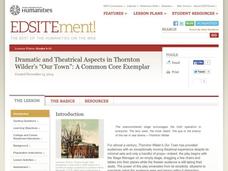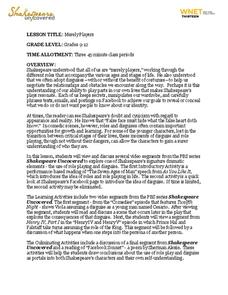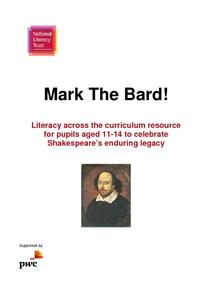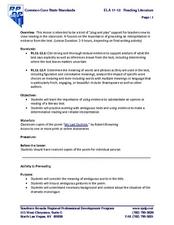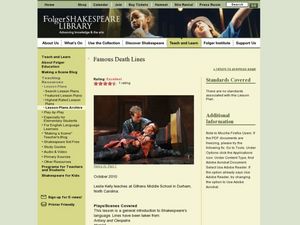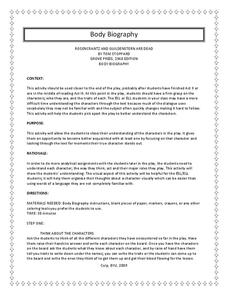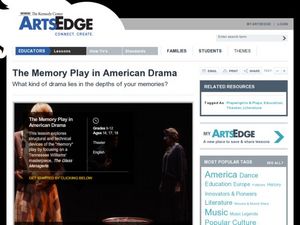National Endowment for the Humanities
Dramatic and Theatrical Aspects in Thornton Wilder’s “Our Town”: A Common Core Exemplar
“So I’m going to have a copy of this play put in the cornerstone and the people a thousand years from now’ll know a few simple facts about us.” Our Town is used as the text in a Common Core exemplar that examines the dramatic and...
Curated OER
Merely Players
Disguises and role playing are the focus of a resource that uses Shakespeare’s As You Like It, Twelfth Night, and Henry IV, Part I, to demonstrate how we all play many parts in our lives; how we all are “merely players.” The many...
National Literacy Trust
Mark The Bard!
Commemorate the 400th anniversary of Shakespeare's death with a packet of cross-curricular literacy lessons and activities centered around two of the Bard's most popular plays, Macbeth and The Tempest. Class members look for evidence of...
California Department of Education
Tragoidia and Catharsis: A Retelling of Classical Tragedies
What a tragedy! Scholars take a close look at Greek tragedy in the form of plays. After analyzing plays, learners think about a play that relates to their own personal anxiety and recreate or reinterpret a scene from that play.
National Endowment for the Humanities
The Glass Menagerie: Impact of Expressionism
Young scholars are challenged to write a realistic analysis of Tennessee Williams' nonrealistic memory play, The Glass Menagerie. Writers use the evidence gathered on their worksheets to craft an effective thesis and concluding statement...
National Endowment for the Humanities
The Glass Menagerie as Expressionist Theatre
The first lesson in a three-part unit has high schoolers examine The Glass Menagerie as an example of expressionist theatre. After reading a short article about expressionism, scholars list expressionist techniques in Tennessee Williams'...
Star Wars in the Classroom
"Shakespeare and Star Wars": Lesson Plan Day 3
To make the point that there are many forms of language, each with its own purpose, class members select 10 lines from Doescher's play, translate these lines first into contemporary English and then into "SMS/Tweet."
Curated OER
Being in the Noh: An Introduction to Japanese Noh Plays
Students analyze the conventions used in Noh plays and write an introduction to a Noh play of their own. In this Noh play lesson, students identify the conventions of the Noh form and analyze the realizations the main character achieves....
K20 LEARN
It Wasn't Me: "The Crucible"
Scholars complete their study of the collective fear in Arthur Miller's "The Crucible" by conducting a mock trial to determine how many witches are in the class. Groups then analyze sections of the play for the literary devices used and...
National Endowment for the Humanities
The Glass Menagerie: Key Themes
Using the list of expressionist techniques generated in the first lesson, groups analyze how Williams uses these techniques to develop one of the play's themes. The whole class then shares and discusses the examples they found where...
Brigham Young University
Rosencrantz and Guildenstern Are Dead: Fishbowl Discussion
After reading through Act II of Rosencrantz and Guildenstern Are Dead, take some time to discuss the references to death in the play. For this fishbowl discussion, learners prepare questions, practice answering individually and with...
Southern Nevada Regional Professional Development Program
Reading Literature - My Last Dutchess
Draw back the curtain, add a spot of joy to your class, and let learners be instructional activityed by a close reading exercise that models how to develop an interpretation based on evidence drawn from a text. Robert Browning’s dramatic...
National Endowment for the Humanities
Hamlet Meets Chushingura: Traditions of the Revenge Tragedy
Students read texts, view film and video and conduct research in an analysis and comparison of Shakespeare's "Hamlet" and the Kabuki piece "Chushingura". They focus their analysis on the theme of revenge.
Star Wars in the Classroom
"Shakespeare and Star Wars": Lesson Plan Day 6
How can a screenplay create meaning and drama in ways that other forms of writing cannot? That is the question class members must answer as they compare the cantina scene of the screenplay for George Lucas's Star Wars: A New Hope with...
Star Wars in the Classroom
"Shakespeare and Star Wars": Lesson Plan Days 13 and 14
How important are sound effects in films? In stage plays? In radio programs? To gain an understanding of the impact of these special effects, class members watch a short video spoof of the sound in a scene from Star Wars: A New...
Maine Content Literacy Project
Introduction to Ernest Hemingway
What is a white elephant, and what does it have to do with Ernest Hemingway? Study "Hills Like White Elephants" in-depth by following the procedures outlined in this lesson, the fifth in a series of fourteen. Learners start the day with...
Curated OER
Famous Death Lines
High schoolers examine Shakespeare's language. They select and explore death scenes from plays that they're familiar with and practice delivering famous death lines to one another. They should attempt to recreate the emotions that they...
Brigham Young University
Rosencrantz and Guildenstern Are Dead: Body Biography
Pause in your reading of Rosencrantz and Guildenstern Are Dead to take an in-depth look at the characters. Learners examine a chosen character by drawing a body and assigning quotes and traits to specific areas of the body, thinking...
Curated OER
Rosencrantz and Guildenstern Are Dead: "Teach Each Other" Discussion
Challenge your class to hold a discussion about the theme of death in Rosencrantz and Guildenstern Are Dead without direct teacher guidance. After going over the discussion protocols and quotes from the text, learners move in a circle...
Curated OER
The Memory Play in American Drama
Students take a closer look at a memory play. In this American drama lesson, students read Tennessee Williams's The Glass Menagerie and analyze it as a memory play. Students discuss the linear and non-linear aspects of the play prior to...
Curated OER
Dramatic Pause
Students view live theatre. In this play productions lesson, students visit selected venues online or in person to see up to 41 plays in the United Kingdom.
National Endowment for the Humanities
Shakespeare's Macbeth: Fear and the "Dagger of the Mind"
High schoolers read and analyze Shakespeare's play, 'Macbeth.' They analyze how Shakespeare uses metaphors, imagery and dramatic cues to demonstrate Macbeth's response to fear, and perform without words a scene dramatizing Macbeth's...
Shakespeare Uncovered
Merely Players
“. . . one man in his time plays many parts,/His acts being seven ages.” Jaques famous speech from Act II, scene vii of As you Like It sets the stage for an examination of the roles people play. Class members not only consider the roles...
Curated OER
Exploring the Expository Scenes in Macbeth
Students examine the function of exposition in play structure. They will be able to develop multiple interpretations and visual and aural production choices for Shakespearean scenes and choose those that are most interesting.
Other popular searches
- Preschool Dramatic Play
- Dramatic Play Reporter
- Dramatic Play Lesson Plans
- Dramatic Play Post Office
- Family Dramatic Play
- Preschool Dramatic Play Fall
- Dramatic Play and Puppetry
- Dramatic Play Letter R
- Dramatic Play Activities
- Preschool Dramatic Play Bugs
- Preschool Dramatic Play Farm
- Pet Shop Dramatic Play


